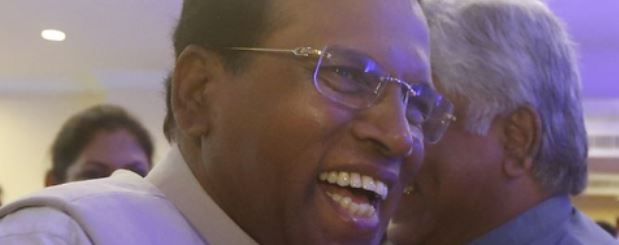Pallewatte Gamaralalage Maithripala Yapa Sisirena, Sri Lanka’s president-elect, was a low-profile cabinet colleague of longtime president Mahinda Rajapaksa until he switched sides to become joint opposition candidate and emerge as the proverbial dark horse in the presidential polls.
The 63-year-old farmer-turned-politician deserted the incumbent president to take charge of the fractured opposition ahead of the polls with a promise to “end the Rajapaksa family rule” and romped home victorious.
With his peasant background, Sirisena appealed to the rural electorate while his main backer, the United National Party, enjoyed popularity in urban areas.
Hailing from the rural north central province, Sirisena does not speak English, is ever seen in the national dress.
He has no background of hobnobbing with the Colombo elite and socialites. No old boy of a leading Colombo school, he was more than a match for Rajapaksa’s rural appeal.
In the run up to the election, he pledged to abolish the executive presidency within 100 days of being elected, repeal the controversial 18th amendment, re-instate the 17th amendment and appoint UNP leader Ranil Wickremasinghe as prime minister.
•MUST READ: The tyrant falls: Why Rajapaksa lost
Sirisena took on the ruling family, charging that the country was heading towards a dictatorship with corruption and nepotism prevailing.
Accused of being a proxy of former president Chandrika Kumaratunga, who asked her loyalists to vote for him, Sirisena vowed to root out corruption and bring constitutional reforms to weaken the power of the presidency.
Sirisena backed by the main opposition United National Party and another key breakaway group, the Jathika Hela Urumaya or the Buddhist Monk party plan to chalk out a series of constitutional and democratic reforms.
Born on 3 September 1951, Sirisena joined mainstream politics in 1989 through the Sri Lankan Freedom Party.
The son of a World War II veteran, Sirisena was in jail for almost two years after being arrested on suspicion of leading a revolt against the government in 1971.
Sirisena contested the 1989 parliamentary election as an SLFP candidate in Polonnaruwa district and was elected to Parliament. He was re-elected at the 1994 parliamentary election, this time as a People’s Alliance candidate.
He was re-elected to Parliament at the 2000 parliamentary election and retained his ministerial portfolio. He was re-elected at the 2001 parliamentary election but the PA lost the election.
Besides serving as health minister, he also served as the acting defence minister on several occasions.
During the height of the civil war, Sirisena said he was a soft target for the Tamil Tiger rebels with the separatists trying to assassinate him on at least five occasions.
In 2008, Sirisena escaped unhurt when a convoy he was part of was attacked by a Liberation Tigers of Tamil Eelam’s suicide bomber at Piriwena Junction in Colombo. One person was killed and seven injured in the attack.
Rediff
